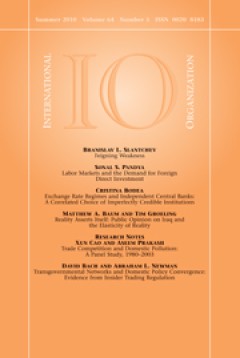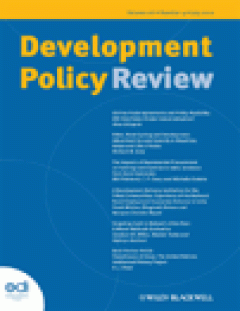Filter by

Constraining Coercion? Legitimacy and Its Role in U.S. Trade Policy, 1975–2000
The role of legitimacy in international relations is a topic of much debate, yet there is little understanding of the mechanism behind it. Here I address this discrepancy by asking: are state threats perceived as (il)legitimate more or less likely to be successful? By operationalizing illegitimacy as unilateral action in the presence of a multilateral option, I consider the variation in the suc…
- Edition
- Vol. 64 No. 1, January 2010.pp. 65-96
- ISBN/ISSN
- 00208183
- Collation
- -
- Series Title
- International Organization
- Call Number
- -

Toward Internationally Regulated Goods: Controlling the Trade in Small Arms a…
Contrary to the general trend of trade liberalization, specific goods�such as small arms, drugs, and antiquities�have come under increasing international control in recent decades through a set of international regulatory agreements. This article offers a theoretical framework of government preferences on the international regulation of these goods. Departing from conventional models of trade p…
- Edition
- Vol. 64 January 2010 January 2010.pp. 97-131
- ISBN/ISSN
- 00208183
- Collation
- -
- Series Title
- International Organization
- Call Number
- -

How Opportunity Costs Decrease the Probability of War in an Incomplete Inform…
This article shows that the opportunity costs resulting from economic interdependence decrease the probability of war in an incomplete information game. This result is strongly consistent with existing empirical analyses of the inverse trade-conflict relationship but is the opposite of the conclusion reached by Gartzke, Li, and Boehmer, who reject the opportunity cost argument in a game-theoret…
- Edition
- Vol. 64 No. 1 January 2010.pp. 133-144
- ISBN/ISSN
- 00208183
- Collation
- -
- Series Title
- International Organization
- Call Number
- -

Spatial Effects in Dyadic Data
Political units often spatially depend in their policy choices on other units. This also holds in dyadic settings where, as in much of international relations research, analysis focuses on the interaction or relation between a pair or dyad of two political units. Yet, with few exceptions, social scientists have analyzed contagion in monadic datasets only, consisting of individual political unit…
- Edition
- Vol. 64 No. 1 January 2010.pp. 145-166
- ISBN/ISSN
- 00208183
- Collation
- -
- Series Title
- International Organization
- Call Number
- -

Do Democracies Make Inferior Counterinsurgents? Reassessing Democracy's Impac…
A core proposition from decades of research on internal wars asserts that democracies, with their casualty-averse publics, accountable leaders, and free media, are uniquely prone to losing counterinsurgency (COIN) wars. Yet one should question this finding, for two reasons. First, existing studies overwhelmingly adopt no-variance research designs that only examine democracies, leaving them unab…
- Edition
- Vol. 64 No. 1 January 2010.pp. 167-192
- ISBN/ISSN
- 00208183
- Collation
- -
- Series Title
- International Organization
- Call Number
- -

Policy Experiments, Democratic Ownership and Development Assistance
In an effort to enhance the impact of development aid, recipients are called on to provide democratically sustained �ownership� for development policies, and donors to align their interventions with these ownership-dictated strategies of their partners. This article illustrates the weaknesses of such an approach. From a political-economy perspective, severe tensions exist between concepts of de…
- Edition
- Volume 28, Issue 5, September 2010, pages 515–534
- ISBN/ISSN
- 09506764
- Collation
- -
- Series Title
- Development Policy Review
- Call Number
- -

Eastern Donors and Western Soft Law: Towards a DAC Donor Peer Review of China…
The international system is still governed by a normative framework designed mainly by OECD countries, especially with regard to soft-law standards in the field of development co-operation. However, the growing relevance of �Eastern donors� is weakening its efficiency and raises the question of how compliance with these standards can be assured in a changing donor landscape. Despite efforts to …
- Edition
- Volume 28, Issue 5, September 2010. pages 535–552
- ISBN/ISSN
- 09506764
- Collation
- -
- Series Title
- Development Policy Review
- Call Number
- -

Revenue Mobilisation in Sub-Saharan Africa: Challenges from Globalisation I �…
This is the first of two articles evaluating the nature and extent of, and possible responses to, two of the central challenges that globalisation poses for revenue mobilisation in sub-Saharan Africa: trade liberalisation, and corporate tax competition. Both articles use a new dataset with the features needed to address these issues meaningfully: a disentangling of tariff from commodity tax rev…
- Edition
- Volume 28, Issue 5, September 2010. pages 553–571
- ISBN/ISSN
- 09506764
- Collation
- -
- Series Title
- Development Policy Review
- Call Number
- -

Revenue Mobilisation in Sub-Saharan Africa: Challenges from Globalisation II …
This second article evaluates and discusses the challenges to government revenue in sub-Saharan Africa posed by developments in corporate taxation. Using the dataset described in the first article, it shows that, in broad terms, corporate tax revenues in the region have held up, despite a reduction in rates and evidence of substantial base-narrowing (mainly through the provision of tax holidays…
- Edition
- Volume 28, Issue 5, September 2010. pages 573–596
- ISBN/ISSN
- 09506764
- Collation
- -
- Series Title
- Development Policy Review
- Call Number
- -

Linking State and Non-State Security and Justice
Until recently links between state and non-state security and justice have been given scant attention, despite being an important part of safety and security provision in the South. This article examines the circumstances in which such linkages occur; the benefits enjoyed by the partners; and the problems encountered. It considers how their success is to be measured, and how and when they can b…
- Edition
- Volume 28, Issue 5, September 2010. pages 597–616
- ISBN/ISSN
- 09506764
- Collation
- -
- Series Title
- Development Policy Review
- Call Number
- -

Measuring Multidimensional Aspiration Gaps: A Means to Understanding Cultural…
This article links primary research into the way subjective well-being among poor people can be defined and measured to the growing literature on poverty as a failure of capacity to aspire. Data from Bangladesh, Thailand and Peru are used to illustrate a measurement strategy based on defining well-being as a function of the gap between individuals� diverse and multiple aspirations, and their sa…
- Edition
- Volume 28, Issue 5, September 2010. pages 617–633
- ISBN/ISSN
- 09506764
- Collation
- -
- Series Title
- Development Policy Review
- Call Number
- -

Bricks and Mortar Clientelism: Sectarianism and the Logics of Welfare Allocat…
In plural societies, social welfare can be a terrain of political contestation, particularly when public welfare functions are underdeveloped and ethnic or religious groups provide basic social services. It is well established that such organizations favor in-group members, but under what conditions do they serve out-group communities? To address this question, the authors compare the welfare…
- Edition
- Vol. 62, No. 3 July 2010.pp. 381-421
- ISBN/ISSN
- 00438871
- Collation
- -
- Series Title
- WORLD POLITICS
- Call Number
- -

Choosing to Target: What Types of Countries Get Different Types of World Bank…
Well-governed countries are more likely to make use of foreign aid for the purposes of economic development and poverty alleviation. Therefore, if aid agencies are providing funds for the sake of development, these countries should receive more aid and categorically different types of aid as compared with poorly governed countries. In poorly governed countries aid should be given in forms that …
- Edition
- Vol. 62, No. 3 July 2010. pp. 422-458
- ISBN/ISSN
- 00438871
- Collation
- -
- Series Title
- WORLD POLITICS
- Call Number
- -

Power and the Ascendance of New Economic Policy Ideas: Lessons from the 1980s…
Recent explanations of transformations of macroeconomic policy under crisis conditions spotlight the intrinsic properties of ideas and the persuasiveness with which they are marketed. Bridging the divide between power and discourse approaches, this article reveals the causal role played by the power resources of expert ideational entrepreneurs, conditional on the political conjuncture in which …
- Edition
- Vol. 62, No. 3 July 2010.pp. 459-495
- ISBN/ISSN
- 00438871
- Collation
- -
- Series Title
- WORLD POLITICS
- Call Number
- -

How Do Crises Lead to Change? Liberalizing Capital Controls in the Early Year…
How do crises lead to change? Rationalist approaches to the question that emphasize inexorable structural responses and the pursuit of distributive preferences by newly dominant coalitions, are inadequate because they obscure the social mediation of material events and the pervasive uncertainty that follows destabilization of the precrisis status quo, which constrains actors from fully graspin…
- Edition
- Vol. 62, No. 3 July 2010.pp. 496-524
- ISBN/ISSN
- 00438871
- Collation
- -
- Series Title
- WORLD POLITICS
- Call Number
- -

The Gender Revolution: Uneven and Stalled
In this article, the author describes sweeping changes in the gender system and offers explanations for why change has been uneven. Because the devaluation of activities done by women has changed little, women have had strong incentive to enter male jobs, but men have had little incentive to take on female activities or jobs. The gender egalitarianism that gained traction was the notion that wo…
- Edition
- Vol. 24 no. 2 April 2010.pp. 149-166
- ISBN/ISSN
- 08912432
- Collation
- -
- Series Title
- Gender & Society
- Call Number
- -

Elementary School Girls and Heteronormativity: The Girl Project
- Edition
- Vol. 24 no. 2, April 2010.pp. 167-188
- ISBN/ISSN
- 08912432
- Collation
- -
- Series Title
- Gender & Society
- Call Number
- -
- Edition
- Vol. 24 no. 2, April 2010.pp. 167-188
- ISBN/ISSN
- 08912432
- Collation
- -
- Series Title
- Gender & Society
- Call Number
- -

Occupational Sex Composition and the Gendered Availability of Workplace Support
This study examines how occupational sex segregation affects women�s and men�s perceptions of the availability of workplace support. Drawing on theories of gender and empirical studies of workplace tokenism, the author develops the concept of an occupational minority. Although the notion of tokenism was developed to describe processes at the level of the workplace, the author explores how being…
- Edition
- Vol. 24 no. 2, April 2010.pp. 189-212
- ISBN/ISSN
- 08912432
- Collation
- -
- Series Title
- Gender & Society
- Call Number
- -

Making Gender Fit and “Correcting” Gender Misfits: Sex Segregated Employm…
This article highlights the extent to which finding a job without actively searching (�nonsearching�) sustains workplace sex segregation. We suspect that unsolicited information from job informants that prompts fortuitous job changes is susceptible to bias about gender �fit� and segregates workers. Results from analyses of 1,119 respondents to the 1996 and 1998 waves of the National Longitudina…
- Edition
- Vol. 24 no. 2, April 2010.pp. 213-236
- ISBN/ISSN
- 08912432
- Collation
- -
- Series Title
- Gender & Society
- Call Number
- -

Ways to Come, Ways to Leave: Gender, Mobility, and Il/legality among Ethiopia…
Based on anthropological fieldwork in Yemen, this article examines the relationship between gender, mobility, and il/legality in the lives of Ethiopian domestic workers. Studies about migrant domestic workers in the Middle East often focus on abuse and exploitation, making a plea for the regulation of women�s legal status. Yet legal migration does not automatically mean that women gain more rig…
- Edition
- Vol. 24 no. 2, April 2010.pp. 237-260
- ISBN/ISSN
- 08912432
- Collation
- -
- Series Title
- Gender & Society
- Call Number
- -
 Computer Science, Information & General Works
Computer Science, Information & General Works  Philosophy & Psychology
Philosophy & Psychology  Religion
Religion  Social Sciences
Social Sciences  Language
Language  Pure Science
Pure Science  Applied Sciences
Applied Sciences  Art & Recreation
Art & Recreation  Literature
Literature  History & Geography
History & Geography